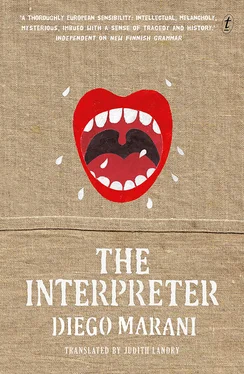Diego Marani
The Interpreter
DIEGO MARANI was born in Ferrara in 1959. He has worked as a translator and policy officer for the European Commission and has written several other novels, collections of essays and short stories. He has been awarded the Campiello Prize, the Stresa Prize for The Last of the Vostyachs , and the Bruno Cavallini Prize. New Finnish Grammar received the Grinzane-Cavour Prize, was shortlisted for the Independent Foreign Fiction Award and the Best Translated Book Award, and was longlisted for the European Book Prize. Marani invented the mock language Europanto, in which he has written columns for European newspapers. In addition to the trilogy of stand-alone novels about language and identity, Text has also published Marani’s intriguing novel God’s Dog . Diego Marani lives in Brussels with his wife and two children.
JUDITH LANDRY is a translator of works of fiction, art and architecture. Her translations include The Last of the Vostyachs by Diego Marani, The House by the Medlar Tree by Giovanni Verga, The Devil in Love by Jacques Cazotte, A Bag of Marbles by Joseph Joffo, and Smarra & Trilby by Charles Nodier. In 2012, she was awarded the Oxford-Weidenfeld Translation Prize for New Finnish Grammar .
To Simona, Alessandro and Elisabetta
In times to come,
chaos will reign in Hell itself.
SERBIAN PROVERB
This is the story of my undoing: of how one single man snatched me from those I loved, from my profession, from my private life, and bore me to my ruin, a prey to confusion and mind-befogging illness. Not that this was his callous aim: he couldn’t help himself. He simply failed to notice that he was dragging me into that self-same dizzying abyss into which he himself was hurtling. And it is this very fact that makes my torment all the more unbearable. Today I live as a slave to another man’s madness. I see its fearful workings before my eyes, I am a lucid witness to its utter inhumanity, and nothing prevents me from walking away, but I stay. Because by now, for me, any other life would be still greater madness. So each day I wake up, bow my head wearily and carry on, working through a heartless destiny which has chosen me, of all men, for its experiment. Each day I nurture the wild beast to which I am chained; my mind is like a stone, my thoughts like clefts within it, my body a sloughed skin, staked out with wooden pickets and laid out to dry.
That year, the tulips came up diseased. They wilted on the grass, rotten and black with gnats. I’d planted them one misty November afternoon, with all the morbid enthusiasm of an artificer laying his mines, and throughout the winter I awaited their explosions. They rotted without ever opening, trickles of rust stippling their stems. That should already have struck me as an omen. All the neighbouring gardens looked stricken, as though blighted by some invisible disease. Foul air wafted from the houses like the breath of some troubled sleeper; green-streaked light fell from a leaden sky. That strange dampness hanging over things — poisoning plants, driving birds from their nests — betokened death. I would see the birds of an evening, fluttering in alarm, perched on the highest branches of the lime tree; the next morning I would find broken eggs and little corpses covered in excrement. Everything seemed to be turning to stone; I began to feel that the only thing that was made of flesh and blood in that whole sorry set-up was me. But slowly I too was becoming petrified, assuming a mineral heaviness.
At least Irene was still with me then. I had her presence to channel the flow of my days, the rhythm of her breathing to hold my nights together. The fine tuning between us, in our household intimacy, was so perfect that we had no need for speech. We could communicate by means of sound. When I heard the taps in the upstairs bathroom running, I knew that Irene was going to have a bath, and the time on the clock and the day of the week on the calendar told me the rest: whether it was the cinema or the restaurant that she wanted to go to. In winter, the prolonged creaking of the parquet in the living room of a Sunday morning was a summons: Irene was sitting on the sofa, waiting for me. We would be going out for an aperitif, or to buy flowers. When I came home late from the office, if I heard the sound of drawers being continuously opened and closed, I knew that she was in a bad mood, or irritated with me because I was late. Then I would put on the television and turn up the volume of the signature tune of our favourite programme to lure her down. On weekend afternoons, if she failed to hear me moving around in my study, it was she who would come up to look for me, throwing open the window and saying: ‘It’s stuffy in here!’ She would take me by the hand and lead me into the living room, then sit down at the piano and begin to play.
I’d lived a quiet, somewhat circumspect life with Irene for many years. We’d met each other too late in life for our by now hardened sense of solitude to melt away in the warmth of mutual affection. We each nursed our independence as though it were an ageing parent whom we treated abruptly, distantly, secretly chiding it for its dogged capacity for survival. Yet, side by side, we kept each other company in the old house where we had gone to live together. We had rented it almost by way of a joke, a challenge: it was too big for us, too expensive to maintain, and there was too much garden. But those large spaces, those light-filled rooms, served to remind us both of the cramped lodgings of our earlier existences. With time, we’d fashioned those walls to our own shapes. The floors bore the imprint of our passing, the wood was worn from contact with our hands. The light switches and window frames responded to our touch; despite the imperfections that had accumulated over the years, they remained docile and obedient when it was we who pressed upon or raised them. We had become commingled with the essence of that house, with the materials of which it was constructed; its stonework, its panelling, its dust were impregnated with our being, to the point of giving out our very smell. We in return bore it upon our clothes; it came gusting towards us when we opened the door, back from some holiday. I would sometimes come upon it, when I was travelling for my work, lurking in some handkerchief, or in a book, or in a tie left too long in a cupboard. Over time, Irene had filled the rooms with antique furniture; she had great flair, and would frequently unearth rare or striking pieces. She would spend hours in antique shops she’d come across in some out-of-the-way village across the border, and when she had found something that particularly caught her fancy, she was like a dog with a bone: she’d stroke it and sniff at it, examine handles and hinges, test out the locks, listen to the creaking of the joints, open and close drawers and doors, drumming on the wood with her knuckles. But she would make a purchase only after meticulous deliberation. She would subject the puzzled vendor to lengthy questioning, until she had extracted all that he knew about the history of the item in question; then, when it seemed that the deal was about to be done, she would thank him and be off, saying that she also wanted to give the piece in question time to think. Running the risk of finding it gone, she would return to the shop several days later, at a different time: to take the item by surprise, she would say, because only in its lonely abandonment, stripped of all expectations, would the old wood loosen its fibres and reveal its soul.
Читать дальше












